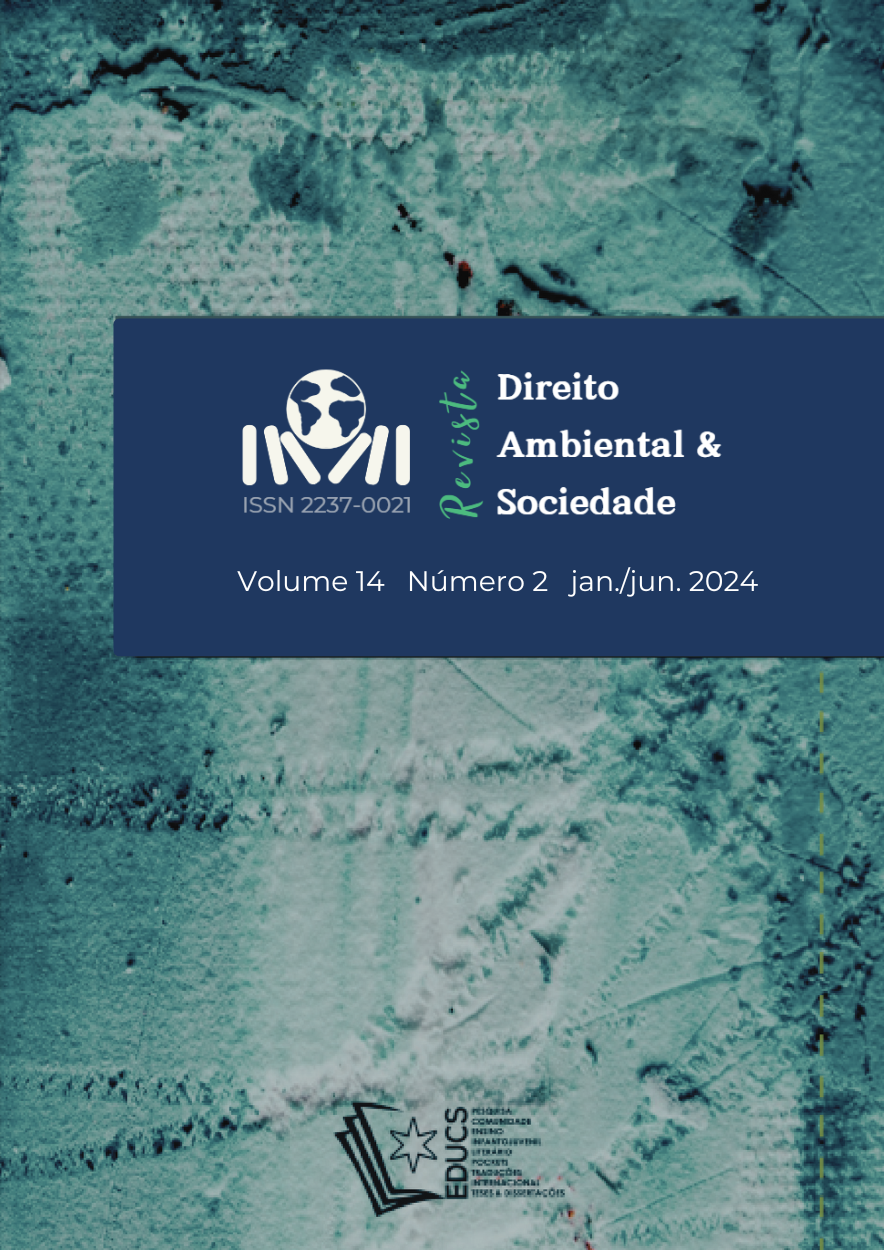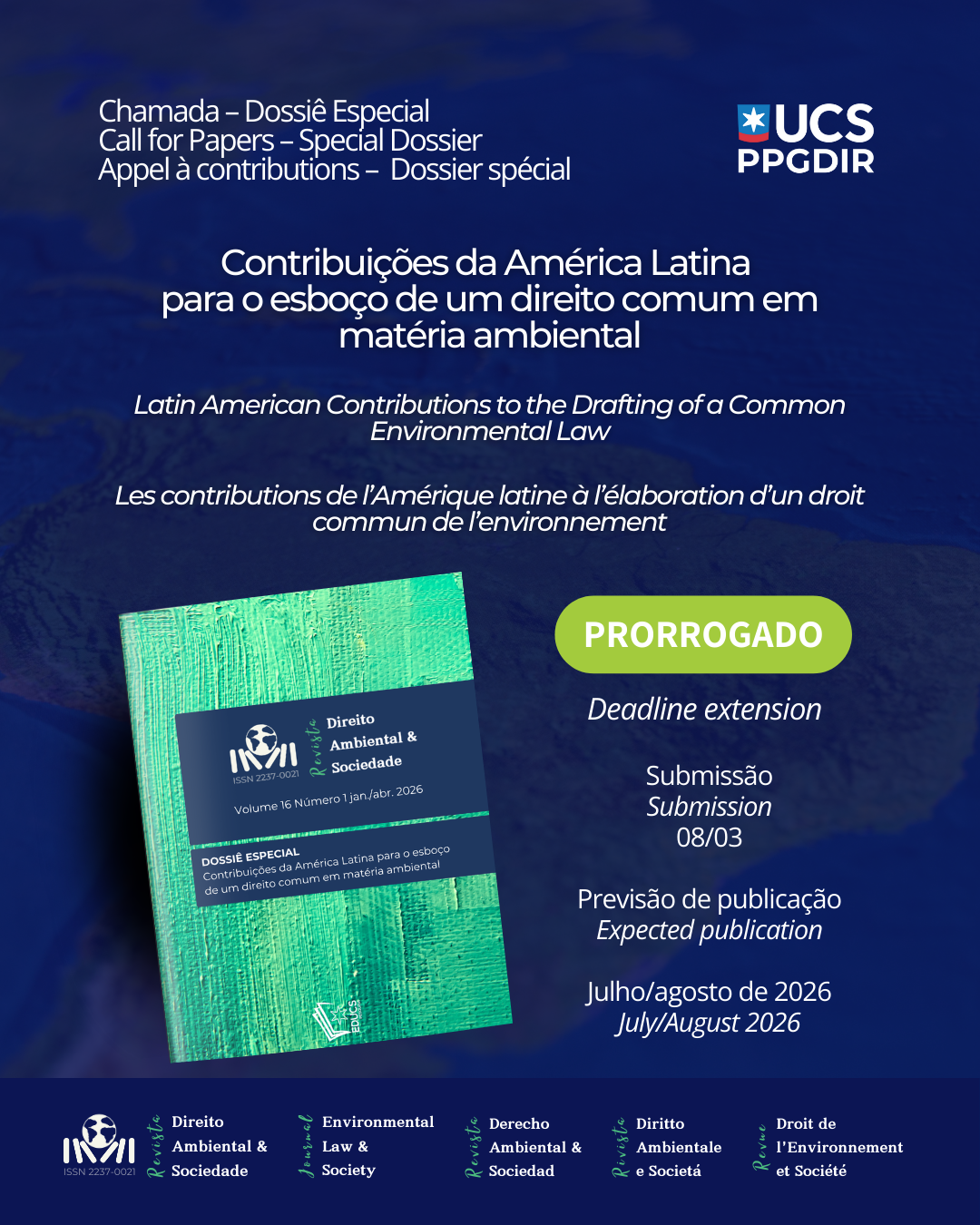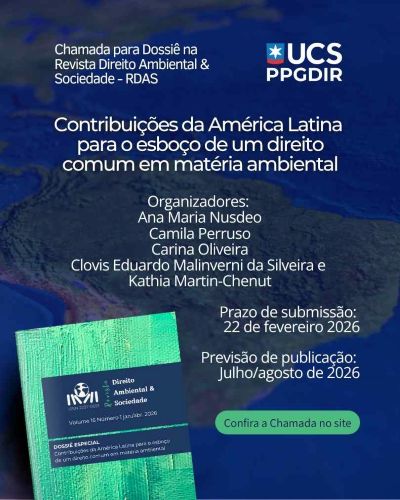Echoes of Eco-Consciousness
An Analysis of Tribal Community Relationship with Nature in Mahasweta Devi’s Chotti Munda and His Arrow and Leslie Silko’s Ceremony
DOI:
https://doi.org/10.18226/22370021.v14.n2.18Palavras-chave:
comunidades tribais, ecocriticismo, natureza, ecoconsciênciaResumo
Nature serves as the primary source of sustenance for humanity. The environment has the power to evoke emotions with its beauty of landscapes, the tranquillity of natural settings, and the splendours of flora and fauna, inspiring imagination, contemplation, and a resounding sense of connection. In modern times, technological advancements have propelled societies forward, improving efficiency, connectivity, and the overall quality of life. However, this progress has come at a cost, leading to environmental degradation or natural crises. The relationship between tribal communities and nature is reciprocal and symbiotic, as nature nurtures man, delivering indispensable resources similarly tribal communities strive to protect the environment. This research paper explores the eco-consciousness of tribal communities in Mahasweta Devi’s Chotti Munda and His Arrow and Leslie Marmon Silko’s Ceremony through the lens of ecocriticism, a literary theory that examines the relationship between literature and the environment. The study highlights the originality of Indigenous worldviews in these works, where nature is not merely a backdrop but an active participant in the survival and culture of tribal people. The findings illustrate how both authors vividly portray the interconnectedness of Indigenous identity and nature, showing how tribal people nurture and protect their environment in return for sustenance, underscoring their deep ecological insight. This research underscores the importance of integrating Indigenous ecological wisdom into contemporary environmental discourse and suggests that future studies could further explore how such insights can address modern environmental crises.
Downloads
Referências
Arévalo, C. (2023). Protecting the world’s wild animals through indigenous knowledge. Faunalytics. https://faunalytics.org/protecting-the-worlds-wild-animals-through-indigenous-knowledge/
Ambler, M. (1990). Breaking the iron bonds: Indian control of energy development. University Press of Kansas.
Breen, S. D. (2015). Saving seeds: the Svalbard Global Seed Vault, Native American seed-savers, and problems of property. Journal of Agriculture, Food Systems, and Community Development, 5(2), 39–52. http://foodsystemsjournal.org/index.php/fsj/article/view/319
Buell, L. (1995). The environmental imagination: Thoreau, nature writing, and the formation of American culture. Harvard University Press.
Carson, R. T., Hanemann, W. M., & Whittington, D. (2020). The existence value of a distinctive native American culture: Survival of the Hopi reservation. Environmental and resource economics, 75, 931–951. https://link.springer.com/article/10.1007/s10640-020-00412-5
Choudhury, A. D., & Das, D. (2019). Resistance in Nature: an Ecofeminist Study of Mahasweta Devi's Chotti Munda and His Arrow. New Delhi Recognized Journal, 8(5), 55. http://research-chronicler.com/reschro/pdf/v7i1/7115.pdf
Dahal, M. P. (2024). Indigenous knowledge for environmental conservation: An ecocritical approach to Silko’s Ceremony and Gardens in the dunes. The Outlook: Journal of English Studies, 15, 117-126.
Dean, T. (1994). What is eco-criticism? In M. Branch & S. O'Grady (Eds.), Proceedings of the Western Literature Association Meeting: Defining Ecocritical Theory and Practice.
Devi, M. (2002). Chotti Munda and his arrow (G. C. Spivak, Trans.). Seagull Books.
Descola, P. (2005). Par-delà nature et culture. Gallimard. https://doi.org/10.3917/deba.114.0086
Espín-León, A. M., Jimeno-Morenilla, A., Pertegal-Felices, M. L., & Azorín-López, J. (2020). Cultural identity distance computation through artificial intelligence as an analysis tool of the amazon indigenous people. A case study in the Waorani community. Sustainability, 12(22), 9513. https://www.mdpi.com/2071-1050/12/22/9513
Farooq, S. A., & Awan, M. S. (2018). Environmental Justice and Indigenous Feminism: An Eco-Critical Study of Leslie Marmon Silko's Ceremony. NUML Journal of Critical Inquiry, 16(1), 1-VIII. https://search.proquest.com/openview/bad670297ca6fb3ca92cbd2511ffadba/1?pq-origsite=gscholar&cbl=616373
Fahad, A. R., & Sharif, A. (2022). Nature and Psychological Engineering: An Ecopsychological Study of Silko’s Ceremony. Pakistan Journal of Humanities and Social Sciences, 10(2), 688-694.
Ford, J. D., King, N., Galappaththi, E. K., Pearce, T., McDowell, G., & Harper, S. L. (2020). The resilience of indigenous peoples to environmental change. One Earth, 2(6), 532-543.
Frederick Suresh. (2012). Contemporary Contemplation on Ecoliterature, Authorpress, New Delhi.
Glotfelty, C., & Fromm, H. (Eds.). (1996). The ecocriticism reader: Landmarks in literary ecology. University of Georgia Press.
Gersdorf, C., & Mayer, S. (2006). Nature in literary and cultural studies: Defining the subject of ecocriticism – An introduction. In C. Gersdorf & S. Mayer (Eds.), Nature in literary and cultural studies
High, C. (2020). “our land is not for sale!” contesting oil and translating environmental politics in Amazonian Ecuador. The Journal of Latin American and Caribbean Anthropology, 25(2), 301-323. https://anthrosource.onlinelibrary.wiley.com/doi/abs/10.1111/jlca.12494
Hoshino, K. (2008). Leslie Marmon Silko’s “Ceremony”: An ecocritical approach for transformative learning (Master's thesis, University of Toronto, Ontario Institute for Studies in Education, Department of Adult Education and Counselling Psychology).
Hunn, E. (2014). To know them is to love them. Ethnobiology Letters, 5, 146–150. https://www.jstor.org/stable/26423595
Khan, J. U. (2019). History (and/or historicity) of ecocriticism and ecocritical history: An introductory overview. International Journal of Linguistics, Literature and Translation, 2(4), 89-102.
Kern, R. (2003). Ecocriticism: What is it good for? In M. P. Branch & S. Slovic (Eds.), The ISLE reader (pp. 258-281). University of Georgia Press.
Ling, C. H. E. N. (2014). The background and theoretical origin of eco-feminism. Cross-Cultural Communication, 10(4), 104. https://citeseerx.ist.psu.edu/document?repid=rep1&type=pdf&doi=18e8512f8ed98d07122718046ed43eed9f526fec
Mishra, S. K. (2016). Ecocriticism in children's literature: An analysis of Amit Garg's Two tales. Galaxy, 5(5), 91-97.
Naess, A. (1973). The shallow and the deep, long-range ecology movement: A summary. Inquiry, 16(1-4), 95–100.
Orr, L. (1994). Theorizing the Earth: Feminist Approaches to Nature and Leslie Marmon Silko's Ceremony. American Indian Culture and Research Journal, 18(2).
Padel, F. (2016). In the name of sustainable development: Genocide masked as ‘tribal development’. In M. Radhakrishna (Ed.), First citizens: Studies on Adivasis, tribals, and indigenous peoples in India. Oxford University Press.
Park, J. Y. (2018). An ecological reading of Leslie Marmon Silko's ceremony. 미국학, 41(2), 77-92.
Perrin, C. (2019). Suffering with our Dry Land: the Spiritual Relationship with the Environment in Leslie Marmon Silko's Ceremony and Starhawk's The Fifth Sacred Thing. Caliban. French Journal of English Studies, (61), 301-313.
Rakshit, A. K. (2020). Nature as nurturer of tribal well-being: Reading select poetry of Jacinta Kerketta. Middle Flight, 9(1), 200–210.
Saha, A. (2023, March 12). Tribal Sustenance And Survival: Postcolonial Ecofeminism In Mahasweta Devi’s Chotti Munda And His Arrow. Social Values & Society, 5(1), 2023, 25-29. https://doi.org/10.26480/svs.01.2023.25.29
Schweninger, L. (1993). Writing Nature: Silko and Native Americans as Nature Writers. Melus, 18(2), 47-60. https://www.jstor.org/stable/467933
Silko, Leslie Marmon. (1977). Ceremony. New York: The Viking Press, Print.
Silko, L. M. (1991). Yellow woman and the beauty of the spirit. Simon & Schuster.
Severns, C. (2020). The Fight to Protect The Amazon: The Environmental Discourse of the Waorani Resistance Movement. https://lup.lub.lu.se/student-papers/record/9011304/file/9016793.pdf
Soleri, D., & Cleveland, D. A. (1993). Hopi crop diversity and change. Journal of Ethnobiology, 13(2), 203–231. https://ethnobiology.org/sites/default/files/pdfs/JoE/13-2/SoleriCleveland.pdf
Shoba, V., & Nagaraj, P. (2013). Ecology in relation to ecocriticism: A theoretical approach. Indian Journal Of Applied Research, 3(1), 85-86.
Tosic, J. (2006). Ecocriticism – Interdisciplinary study of literature and environment. Working and Living Environmental Protection, 3(1), 43-50.
Warren, Karen.(1997). Ecofeminism: Women, Culture, Nature. Indiana University Press. https://books.google.com/books?hl=en&lr=&id=M2cOWuc9JUgC&oi=fnd&pg=PR11&dq=53.%09Warren,+Karen.(1997).+Ecofeminism:+Women,+Culture,+Nature.+Indiana+University+Press.&ots=dgMateteiA&sig=3bTFvtCmRQo0k1SFpyxfPtrqILc
Xaxa, V. (2008). State, society, and tribes: Issues in post-colonial India. Pearson.
Downloads
Publicado
Como Citar
Edição
Seção
Licença
Copyright (c) 2024 Revista Direito Ambiental e Sociedade

Este trabalho está licenciado sob uma licença Creative Commons Attribution 4.0 International License.
Você tem o direito de:
Compartilhar — copiar e redistribuir o material em qualquer suporte ou formato para qualquer fim, mesmo que comercial.
Adaptar — remixar, transformar, e criar a partir do material para qualquer fim, mesmo que comercial.
O licenciante não pode revogar estes direitos desde que você respeite os termos da licença.
De acordo com os termos seguintes:
Atribuição — Você deve dar o crédito apropriado , prover um link para a licença e indicar se mudanças foram feitas . Você deve fazê-lo em qualquer circunstância razoável, mas de nenhuma maneira que sugira que o licenciante apoia você ou o seu uso.
Sem restrições adicionais — Você não pode aplicar termos jurídicos ou medidas de caráter tecnológico que restrinjam legalmente outros de fazerem algo que a licença permita.
Avisos:
Você não tem de cumprir com os termos da licença relativamente a elementos do material que estejam no domínio público ou cuja utilização seja permitida por uma exceção ou limitação que seja aplicável.
Não são dadas quaisquer garantias. A licença pode não lhe dar todas as autorizações necessárias para o uso pretendido. Por exemplo, outros direitos, tais como direitos de imagem, de privacidade ou direitos morais , podem limitar o uso do material.















